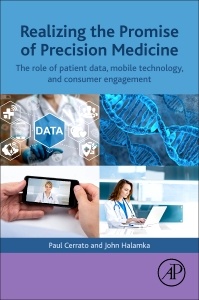Realizing the Promise of Precision Medicine The Role of Patient Data, Mobile Technology, and Consumer Engagement
Auteurs : Cerrato Paul, Halamka John

Realizing the Promise of Precision Medicine: The Role of Patient Data, Mobile Technology, and Consumer Engagement explains the potential of personalized medicine and the value of those approaches in making that potential a reality. The book helps transform one-size-fits-all healthcare into a system that focuses on individual needs and the unique needs of each family member, discussing topics such as U.S. sponsored precision medicine initiative, genomics, the role of electronic health records and mobile medicine, patient engagement and empowerment, health information exchange and patient data protection.
In addition, the book discusses the barriers and limitations of precision medicine and how to overcome them. Readers will find valuable insights into how big data, patient engagement, mobile technology, and genomics help individualize medical care and offer a pathway to help detect many undiscovered causes of diseases.
1. Population medicine versus precision medicine 2. Precision Medicine initiatives and programs 3. The role of genomics in personalized medicine 4. Small Data, Big Data, and Data Analytics 5. How Mobile Technology and EHRs can personalize healthcare 6. i2b2, SHRINE, Clinical Query, and Other Research Tools 7. Overcoming the barriers and limitations of precision medicine 8. Interoperability and Personalized Patient Care 9. Protecting patient privacy and implementing security 10. Consumer and Patient Engagement
physicians;clinicians;nurses;IT professionals.
John Halamka, MD, serves as the International Healthcare Innovation Professor at Harvard Medical School. He is also Chief Information Officer of the Beth Israel Deaconess System and a practicing emergency physician. Dr. Halamka serves on one of the advisory committees for the Precision Medicine Initiative, which has been funded with $215 million from the U.S. government. He has devoted his career to empowering patients, providers, and payers with mobile-friendly applications exchanging data using international standards.
- Provides drawings and flow charts to help readers visualize the breadth and depth of precision medicine
- Includes sidebars with more details on specific topics for a complementary, deeper understanding of the main text
- Uses case studies to turn abstract concepts into flesh and blood examples of how personalized medicine benefits patients
Date de parution : 08-2017
Ouvrage de 218 p.
15x22.8 cm
Thèmes de Realizing the Promise of Precision Medicine :
Mots-clés :
Abbott; Antimalware; API; Application programming interface; Beth Israel Deaconess Medical Center; BIDMC@home; Big Data; Biochemical individuality; Biomarkers; BlueStar; BRCA; CareKit; CCD; Clinical document architecture; Clinical Query 2CQ2i2b2Informatics for Integrating Biology and the Bedside; Columbia University; Communication skills; Continuity of care document; Continuous glucose monitoring; Cybersecurity; Cystic fibrosis; Data analytics; David Graham; Dexcom; Diabetes app; EGFR; EHRs; Electronic health records; Encryption; Exon; Fast healthcare interoperability resources; FHIR; Firewall; Genetic individuality; Genome; Genomics; Gleevec; Graduate medical education; Growth factor receptor positive nonsmall cell lung adenocarcinoma; Hadoop; HbA1c; Health information exchange; HeartHealth Mobile app; Herceptin; HIMSS; HIPAA; Imatinib; INTERHEART study; Interoperability; Intron; Ivacaftor; Jeremy Sussman; John Halamka; Johns Hopkins; LOINC; Malware; MapReplace; Mayo Clinic; Medtronic; mHealth; Microarray analysis; Mobile health apps; Mobile medical apps; Natural language processing; ONC; Ontology; Partners HealthCare; Passwords; Paternalism; Patient engagement; Patient portals; Patient-Centered Clinical Research Network; Patient-Centered Outcomes Research Institute; PCORnet; Personalized health planning; Personalized medicine; Pharmacogenomics; PHI; PMI; Population-based medicine; Precision Medicine Initiative; Precision medicine; Precision oncology; Privacy rule; Protected health information; Randomized clinical trial; Relational database; Remote patient sensors; ResearchKit; Risk factors; Rofecoxib; RxNorm; Security rule; Self-measured blood pressuring monitoring; Shared decision-making; Shared Health Research Information Network; SHRINE; Single nucleotide polymorphism; SNOMED-CT; SNPs; Stanford Medicine; Telemedicine; Text messaging; Trastuzumab; Two-factor authentication; Vioxx; Virtual private network; VPN


